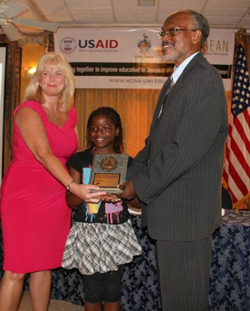Achieving Local Impact for Education in the Caribbean
The morning of June 25, 2013, was a beautiful day in Kingston, Jamaica. Perfect for ceremoniously handing over the Partners for Educational Progress Community of Practice (CoP) to its new home at the University of the West Indies (UWI), Mona Campus School of Education before gathering stakeholders for interviews outside near the old aqueduct. After all, there’s a great story. It’s a story about the success of a USAID/Jamaica-funded CoP using a local ownership approach and the smooth transition to a sustainable, country-led effort.
 The Jamaica Partners for Educational Progress CoP was conceptualized in 2009 by USAID/Jamaica as a country-level CoP that would connect all stakeholders involved in or concerned with basic education in Jamaica. For the first year, strategic efforts were made to assess needs and approaches and to develop an implementation plan. A local team was hired to facilitate the CoP and engage members. The online platform was developed, and in 2010, an in-person launch event brought together a broad array of education stakeholders to learn about the CoP and network with one another. This launch event was critical in bringing together educational thought leaders and creating the space for the inception of what is now often cited as the CoP’s greatest achievement — Camp Summer Plus.
The Jamaica Partners for Educational Progress CoP was conceptualized in 2009 by USAID/Jamaica as a country-level CoP that would connect all stakeholders involved in or concerned with basic education in Jamaica. For the first year, strategic efforts were made to assess needs and approaches and to develop an implementation plan. A local team was hired to facilitate the CoP and engage members. The online platform was developed, and in 2010, an in-person launch event brought together a broad array of education stakeholders to learn about the CoP and network with one another. This launch event was critical in bringing together educational thought leaders and creating the space for the inception of what is now often cited as the CoP’s greatest achievement — Camp Summer Plus.
At the launch event, Earl Phalen, Founder and CEO of Summer Advantage USA, was invited to speak on the importance of summer learning and the consequences of summer learning loss. Based on this experience, the Ministry of Education and USAID/Jamaica partnered to create Camp Summer Plus, a program that engages low-performing students during the summer break to receive critical assistance in mathematics, reading, and enrichment activities. The program recently started its third year, providing 375 Kingston students with access to expanded learning opportunities.
Another key element of that first year was an emphasis on sustainability and careful consideration of potential, local organizations that could take over the project in 2013. In time, as membership grew and relationships were established, the opportunity to host the CoP at UWI’s School of Education became an obvious fit.
The successful transition is due to the efforts over the past year, including:
- initial scoping and capacity requirements
- buy-in from various stakeholders at UWI (such as the IT department)
- strategic planning between the initial CoP team and UWI
- the creation of an agreed upon transition plan with clear roles and responsibilities
- regular check-ins and close collaboration
- onsite training and support
- communications and outreach to CoP members
The CoP now has an expanded regional focus and a new online platform at http://myspot.mona.uwi.edu/cop/. As for the story of what made the CoP a success, stay tuned for multimedia clips with perspectives and lessons from those most intimately involved.



